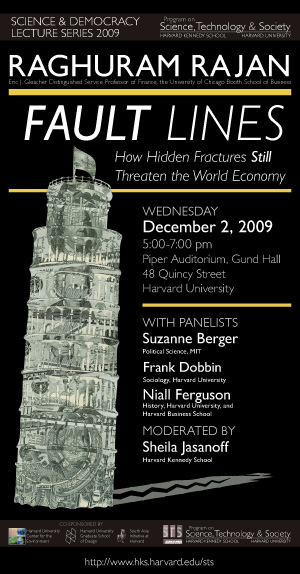Program on Science, Technology and Society at HarvardHarvard Kennedy School of Government | Harvard University |
|||||||
|
|
Fault Lines: How Hidden Fractures Still Threaten the World EconomyRaghuram RajanEric J. Gleacher Distinguished Service Professor of Finance, the University of Chicago Booth School of Business December 2, 2009, 5:00pm-7:00pm AbstractAs the world struggles to recover from the economic crisis of 2008, it is tempting to blame the events on a few greedy bankers who took irrational risks and left the rest of us to foot the bill. In Fault Lines, Rajan argues that serious flaws in the economy are also to blame, and warns that a potentially more devastating crisis awaits us if they are not fixed. He traces the deepening fault lines in a system overly dependent on American consumption to power the world economy and stave off a global downturn; a system where America's thin social safety net has created tremendous political pressure to keep job creation robust, because jobs are the primary provider of health and other benefits; and where the U.S. financial sector, with its skewed incentives, is the critical but unstable link between an overstimulated America and an underconsuming world. In conclusion, heoutlines sensible reforms to ensure a more stable world economy and to restore lasting prosperity. Video of this lecture is located here. PanelSuzanne BergerPolitical Science, MIT Frank DobbinSociology, Harvard University Niall FergusonHistory, Harvard University, and Harvard Business School Moderated bySheila JasanoffHarvard Kennedy School About the speakerRaghuram G. Rajan is Eric J. Gleacher Distinguished Service Professor of Finance at the University of Chicago Booth School of Business. He served as Chief Economist at the International Monetary Fund between 2003 and 2006. He has worked as a consultant for the Indian Finance Ministry, World Bank, Federal Reserve Board, Swedish Parliamentary Commission, and various financial institutions. Rajan is the author, along with fellow Chicago Booth faculty member Luigi Zingales, of the book saving Capitalism from the Capitalists. In 2003, he received the inaugural Fischer Black Prize, which is awarded by the American Finance Association for the person under 40 who has contributed the most to the theory and practice of finance. He received his bachelor's degree from the Indian Institute of Technology in Delhi in 1985, and an MBA from the Indian Institute of Management in 1987. Rajan received his PhD from the Massachusetts Institute of Technology in 1991. Co-sponsored by the School of Engineering and Applied Sciences, the Graduate School of Design, and the South Asia Initiative at Harvard, and the Harvard University Center for the Environment. VideoThis short excerpt from the event was edited by William Firestone. |
||||||
